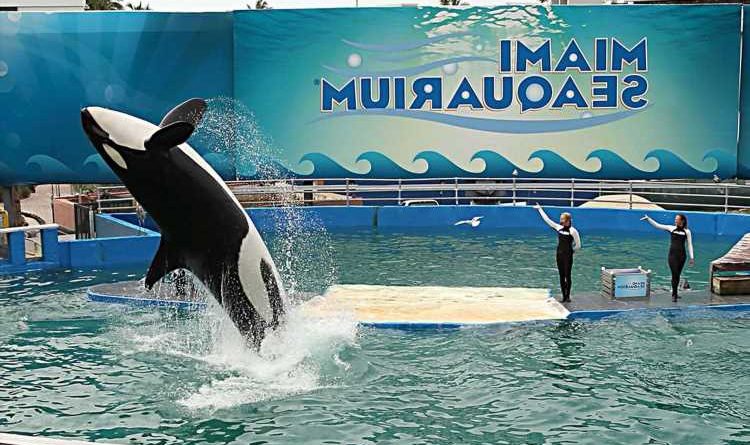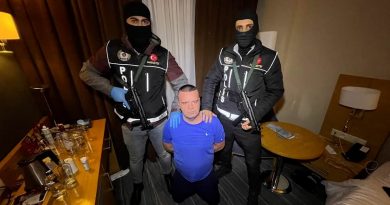Heartbreaking story of killer whale Lolita who is ‘forced to perform injured & starved at aquarium where Flipper filmed’ | The Sun
THE tragic story of a killer whale called Tokitae – who according to a government report is "forced to perform injured and is starved" at an aquarium where Flipper was filmed, could very well be ending.
The Seaquarium in Miami, Florida was accused of serious marine mammal violations in a damning government report published last year, but has since been sold to more amenable owners.
Tokitae, who performed in front of tourists, is the aquarium's star attraction – and is one of the oldest killer whales in captivity, having been locked up in Seaquarium for 51 years.
Campaigners have said that she is far too big for the miniature tank that she lives in – which is only 20 feet deep and just 35 feet wide.
Now, however, there is a fighting chance Tokitae – who goes by the show business name 'Lolita' – could be released into the Pacific north-west, where she belongs now that she is retired.
Conservationists said the female whale's mother is still alive, meaning the pair could be reunited after five decades apart.
In her 90s, the matriarch still guides a pod of whales in the Salish Sea, located between the Canadian province of British Columbia and the U.S. state of Washington.
Activists have been petitioning for killer whales and other mammals in captivity to be released, with many fearing these animals could no longer be equipped to survive in the big blue, after so many years in captivity.
Tokitae, meanwhile, has surprised experts because she has managed to stay in good shape despite her life.
Speaking to the Guardian, Howard Garrett, a whale researcher and activist with the Orca Network on Whidbey Island, who has bene planning her release since 1995, said he was astonished by her ability to stay healthy.
"She’s a miracle every day (…) It’s against all odds that she is still alive. I think it’s about her mental health that keeps her physical health in good shape."
Garrett said Tokitae keeps herself busy by doing laps and racing even with no trainers present
"She’s not withdrawn, neurotic, not the stereotypic behavior that indicates any kind of brain damage associated with being in captivity," he explained. "She may be a complete outlier in her ability to stay healthy."
These welcome news come after a bombshell government report published last year revealed the 56-year-old orca was severely underfed, was given rotting fish to eat and was forced to perform while injured.
A US Department of Agriculture report released in November 2021 listed multiple problems with the aquarium – including "critical" issues with the pools and enclosures for dolphins, seals and the killer whale.
There were also serious problems with poor water quality and inadequate shade for the animals, according to the report.
Inspectors found that dolphins had been injured and some had died – because incompatible animals were often housed together, according to publication NPR.
For about 10 years, Tokitae was forced to share her pool with another killer wave, named Hugo. The male whale died in 1980 after repeatedly slamming his body into the paddock's glass wall.
And the report found that Tokitae and other sea animals were being fed food that was going bad.
Most read in The Sun
Alexander-Arnold among five players axed from England squad but Toney in
Corrie's Lucy Fallon, 26, reveals secret pregnancy after tragic miscarriage
'Abuser' allowed to marry stranger on MAFS despite '3 exes warning police'
I’m a Celebrity legend leaves show after 20 years ahead of new series
According to the USDA report, Lolita's bloodwork showed inflammation after eight days of eating the bad fish.
Staff were also known to override objections that the Seaquarium vet would make – including making her perform head-in jumps despite being injured.
Trainers also cut the amount of fish that Lolita was meant to receive by 30 pounds a day, the 17-page bombshell document said.
Naomi Rose, a marine mammal scientist with the Animal Welfare Institute, at the time claimed: "She injured her jaw because they were making her do things that she was just too old to do.
"And the vet told them not to make her do them anymore. And they ignored the vet."
People in South Florida have been campaigning against Seaquarium for decades – especially for the rights of killer whale Tokitae.
The whale had been doing shows twice a day since she was captured in Puget Sound in the Pacific Northwest in the 1970s.
FREE LOLITA
One protester, Thomas Copeland said he's been coming to the "horrific" aquarium on weekends for four years.
He said: "This place is horrific for animals. It is torture.
"Fifty-one years of captivity for that orca and you won't even get to see her, to see her condition."
Miami Seaquarium's website states they are South Florida’s "best aquarium and favourite visitor attraction."
The popular TV series Flipper TV which was filmed there in the 1960s.
In response to the damning report, the Seaquarium said it is "dedicated to delivering the best care to all of our animals" and is working with the Department of Agriculture’s Animal and Plant Health Inspection Service on issues identified in the report.
At the time, it was reported that the current owner, Palace Entertainment, had sold the aquarium to the Dolphin Company.
The new company, which promised to make improvements to the facilities and to allow authorities to make unannounced inspections, is also more amenable regarding Tokitae's potential release.
While her release would entail a ten-hour journey in a comfortable whale-sized stretcher from Florida to cool waters in Washington state, her rescue would be something of a rarity.
Source: Read Full Article











